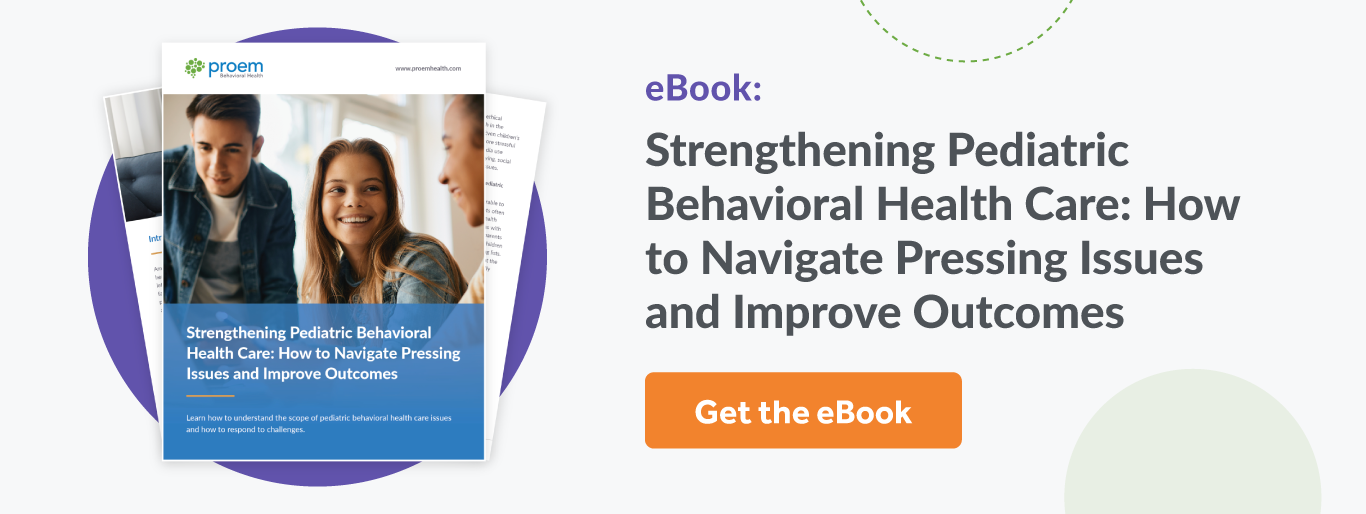The U.S. Preventive Services Task Force (USPSTF) recently issued two new behavioral health-related recommendations for primary care physicians. Let's take a closer look at these recommendations and discuss what we at Proem hope follows these noteworthy announcements.

The task force:
- Reaffirmed its 2016 recommendation that adolescents aged 12 to 18 years should be screened for depression (i.e., major depressive disorder (MDD).
- For the first time, added a separate recommendation that children and adolescents aged 8 to 18 years should be screened for anxiety.
Concerning its MDD recommendation, USPSTF stated the following: "Major depressive disorder in children and adolescents is strongly associated with recurrent depression in adulthood, other mental disorders, and increased risk for suicidal ideation, suicide attempts, and suicide completion." The task force noted that suicide is the second-leading cause of death among those aged 10 to 19 years.
Concerning its anxiety recommendation, USPSTF stated the following: "anxiety disorders in childhood and adolescence are associated with an increased likelihood of a future anxiety disorder or depression." The task force noted the 2018-2019 National Survey of Children's Health found that nearly 8% of children and adolescents aged 3 to 17 years had a current anxiety disorder.
Both recommendations received a "B" grade from USPSTF. This grade means the task force believes there is "high certainty that the net benefit is moderate or there is moderate certainty that the net benefit is moderate to substantial."
As the USPSTF's recommendations state, there are many screening tools available to identify depression and anxiety in children and adolescents. The most-used screening instruments are the Patient Health Questionnaire 9 (PHQ9) for depression and the Screen for Child Anxiety Related Disorders (SCARED) and Social Phobia Inventory for anxiety. The task force notes that an initial screening may be followed by additional questioning or a formal diagnostic interview. For anxiety, USPSTF says if a screening test is positive, a confirmatory diagnostic assessment and follow-up is required.
Importance of the U.S. Preventive Services Task Force
While independent of the U.S. government, USPSTF has significant influence. USPSTF is an independent, volunteer panel of primary care experts. Their work focuses on issuing evidence-based recommendations about preventive services (e.g., screenings, counseling, medications). As KFF notes, "Insurers must cover evidence-based services for adults that have a rating of 'A' or 'B' in the current recommendations of USPSTF." At this time, such services required to be covered without cost-sharing include screenings for depression, diabetes, obesity and various cancers; counseling for drug and tobacco use and other common health concerns; medications that can help prevent HIV, breast cancer, and heart disease; and prenatal tests.
New Screening Recommendations for Kids: What We Hope Comes Next
The USPSTF's new mental health screening recommendations for children and adolescents are hopefully a substantial development. They should help bring greater attention to the behavioral health challenges facing pediatric populations and the value and importance of routine screenings of common conditions like depression and anxiety. We applaud USPSTF for reaffirming its recommendation on screening for depression and making the new recommendation to screen for anxiety.
We're not the only ones recognizing the significance of USPSTF adding anxiety to the list of conditions clinicians should routinely screen for. As Dr. Leana Wen states in a The Washington Post column, "Ultimately, the value of the task force's guideline change is to raise awareness of the high prevalence of anxiety disorder. This common, treatable mental health condition should be regarded with the same level of care and compassion as any other health diagnosis. That means people should be aware and report symptoms to their doctor, and doctors should be far more proactive in looking for signs of it in our patients."
In addition, to increase the likelihood that physicians will begin to perform screening for anxiety disorders, we hope the recommendations will spur health plans to consider increasing coverage for such screening services or including mental health screening in existing bundles of services, such as those covered under CPT 99214. We know that early identification of mental illness that is then followed by accurate diagnosis and effective, monitored treatment leads to improvements in behavioral health that allow children and adolescents to lead healthier lives while reducing healthcare costs. By providing expanded coverage of routine mental health screenings, including those for children and adolescents, more people will gain access to and benefit from these services.
One of the most significant concerns among providers is what to do with those patients, including in pediatric populations, who test positive for a mental illness as we face a lack of psychiatrists available to subsequently support patients. Fortunately, tools like Proem are available to give pediatric care providers the screeners, diagnostic interviews, monitors, scales and measurements needed to uncover the most diagnosed DSM-5 conditions and guide providers on the appropriate next steps so patients get on the right path to improvement.





.png)
-2.jpg)







